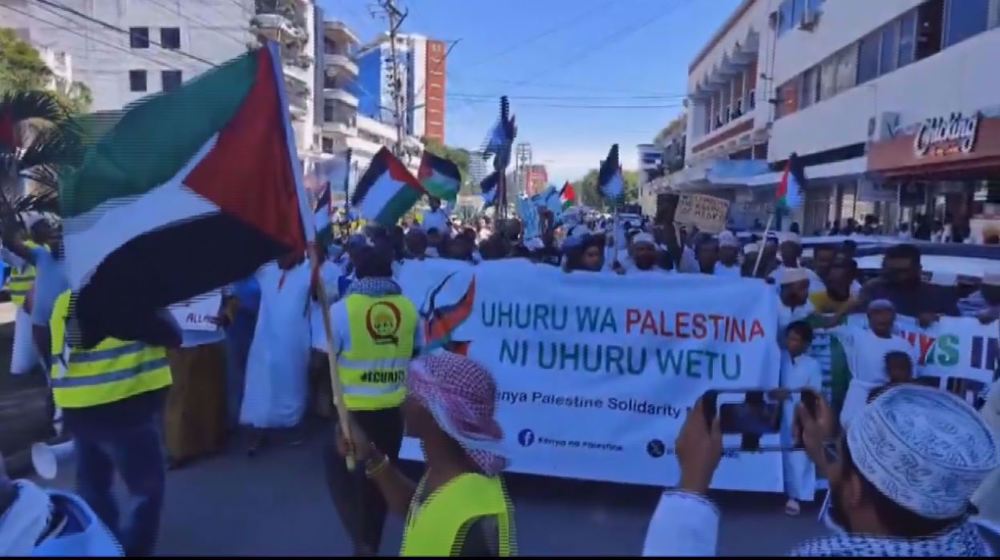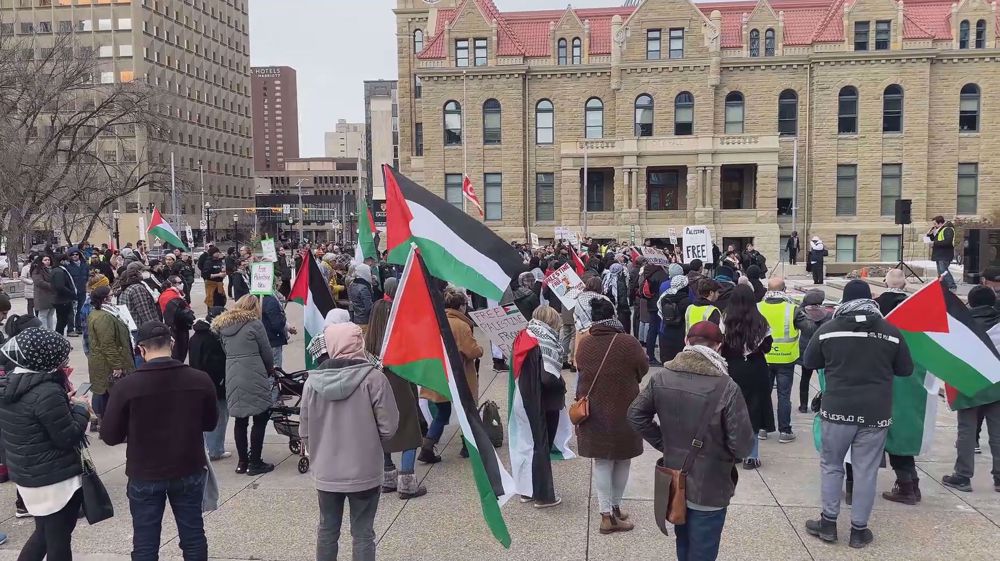US support for Israel’s West Bank annexation anything but ‘peaceful’
By Randi Nord
As millions of Palestinians living in occupation or exile around the world remember the beginning of the Nakba, the Israelis seem determined to keep the 1968 tragedy alive.
US Secretary of State, Mike Pompeo, met with Israeli government leaders last week to discuss moving forward with their so-called “peace plan” of annexing nearly 30% of the West Bank.
Annexation and the Israeli settlements in the West Bank are both illegal under international law (not to mention the countless war crimes Israeli soldiers and settlers commit in Gaza and the West Bank).
Unsurprisingly, Palestinians have condemned the potential annexation, as have EU officials and Jordan.
But will the Israelis actually follow through with their plans to annex the land? And if so, will that trigger an Intifada or broader regional conflict?
Capitalizing on the chaos of coronavirus
The Zionist entity has already exploited COVID-19 to tighten its grip on the Palestinians.
During the pandemic, Tel Aviv has shut down Palestinian testing sites, restricted medical aid from entering Palestinian territories, continued arresting Palestinians, and refused to release prisoners.
By closing the borders and clamping down on medical aid, Israel can weaponize the coronavirus as a biological weapon for ethnic cleansing. Following suit, the Trump regime blocked COVID-19 assistance to Gaza claiming it would be used for “terrorism.”
However, Tel Aviv also sees it as an ideal opportunity to move forward with annexation.
Most countries around the world are preoccupied fighting their own battles against the pandemic. Israel, on the other hand, is on the downswing with cases flattening. The coronavirus serves as a perfect distraction for Israeli crimes to slip under the radar.
Last week, the Zionist entity approved an additional 7,000 settlements in the West Bank in preparation to vote on annexation.
Will the Israelis actually follow through with it?
The Zionist push for annexation rides on a wave of right-wing populism around the world.
After over a year of political deadlock and three elections, Benjamin Netanyahu and his right-wing Likud party have reached an agreement to form a coalition government with rival Benny Gantz of the centrist Blue and White party.
On the backdrop of a corruption investigation, Netanyahu faces pressure from his right-wing voting bloc to follow through with reactionary campaign promises such as annexing Palestinian land. One poll found that roughly half of Israeli Jews support annexing West Bank land so long as Washington is on-board.
Netanyahu also must maintain a right-wing strongman posture against centrist Gantz.
However, annexing the West Bank might not necessarily work in Israel’s favor. Several Palestinians already live in the West Bank so Tel Aviv will either need to forcibly remove them or integrate them as Israeli citizens. While it’s certainly not below Israeli standards to violently remove Palestinians, it might prove more trouble than it’s worth should Palestinians put up a fight.
On the other hand, integrating West Bank Palestinians as Israeli citizens would give them voting rights and effectively disband the two-state solution. This is one reason even many reactionary right-wing Israelis don’t support annexation at this time.
If the Israelis are simply looking for US support, however, they’ll have no shortage of that for the foreseeable future.
The Trump regime has declared its unwavering support for the Zionist entity at every turn imaginable. Washington already moved its embassy from Tel Aviv to Jerusalem al-Quds despite outcry from EU allies and Palestinians. Not only does Donald Trump seems poised to secure another four years in the White House, but even Democratic opposition candidate Joe Biden has openly admitted he will not move the US embassy back to Tel Aviv.
So if all they’re waiting for is US support, the Israelis have plenty of that. Whether or not the Israeli legislature will support the motion remains to be seen.
How will Israeli neighbors and allies respond?
Jordan’s King Abdallah told German outlet Der Spiegel he would consider “all options” should Israelis vote to move forward with their annexation plans.
Jordan has been Israel’s most vocal neighbor to condemn the annexation plans – and for good reason.
The Hashemite Kingdom of Jordan shares a 335km land border with Israel and the occupied West Bank. The territory Israel plans to annex includes a 97km stretch of that land border in the Jordan Valley.
King Abdallah no doubt considers the annexation a direct threat to his own country’s security and entire existence. In previous Israeli- and US-led discussions about the so-called Deal of the Century, officials floated the idea of pushing exiled Palestinians from the West Bank into Jordan, effectively creating a defacto “Palestinian” state inside Jordan.
But it’s not the 1970s anymore and Jordan has minimal leverage. Resisting annexation by cancelling current peace agreements with Israel would put Amman at odds with Washington: Jordan’s single-largest financial supporter. The United States provides over $1 billion in assistance to Amman every year.
The Trump regime has shown it’s not afraid to cut off financial support to entities and organizations that don’t bend to US pressure. Just last month, Washington ended support for the World Health Organization, claiming the WHO was colluding with China in regard to COVID-19.
Taking a stand against Washington and Tel Aviv on annexation would likely force Jordan to commit entirely and realign its geopolitical allies.
Other neighbors have remained fairly mum about the whole thing.
Anyone waiting for Riyadh to wield their financial and political power shouldn’t hold their breath. Unsurprisingly, nothing but crickets has come out of Saudi Arabia.
On the contrary, Crown Prince, Mohammed bin Salman, has strengthened Riyadh’s diplomatic ties with Tel Aviv over the past few years, cooperated with Israel on matters of “security,” and implied it’s time to abandon the Palestinian cause.
It’s worth mentioning that dozens of Palestinian prisoners languish in Saudi jails for “terrorism” charges, proving Riyadh has no problem carrying out Israeli policy in its own land. Of course, there’s also the question of Yemen where Saudi Arabia takes notes directly out of Israel’s genocidal playbook.
An Arab League delegation consisting of officials from Oman, Kuwait, and Qatar met with UN Secretary-General Antonio Guterres in early May to discuss their concern with Israel’s planned annexation. The Arab group released a statement condemning the annexation plans as illegal and detrimental to peace in the region.
For his part, UN Secretary-General Guterres said the annexation will end any potential two-state solution and future peace negotiations.
Egypt, another key Israeli ally and accomplice in many cases, expressed its disdain for Tel Aviv’s plans to annex the West Bank. However, Egyptian officials have not provided any potential response from Cairo should Israel follow through with the plans.
Like Jordan, Egypt’s hands are tied as it relies on the United States for financial assistance: Washington has provided Cairo with $70 billion in economic and military aid since 1980.
Over the past few decades, Washington has successfully kept Israel’s neighbors docile through financial support with political strings attached. While many neighboring countries have condemned Israel’s annexation plans, it’s hard to see a situation where any real action is taken.
European Union foreign ministers have discussed imposing sanctions against Israel if the Zionist entity completes the proposed annexation this summer. Such sanctions could result in the EU removing Israel from certain research programs and agreements.
While not all EU members support sanctions, the EU as a whole seems to agree that annexation is a step away from peace.Washington’s unwavering support for Israel – such as moving the embassy, tearing up the JCPOA, and now the so-called Deal of the Century – continues to put the US at odds with its western allies.
How will Palestinians respond?
The Israelis and their allies in Washington seem to underestimate the resilience of the Palestinian people.
A poll out of the Palestinian Center for Policy and Survey Research found that a whopping 94% of Palestinians reject the plan. Meanwhile, 64% waging an armed struggle to resist implementing the so-called Deal of the Century, which involves annexation.
Even president of the Palestinian Authority, which colludes with Israeli security and effectively carries out Israeli repression in Gaza, condemned Israel’s annexation plans. In April, Mahmoud Abbas saidif the Zionist entity moves forward with annexation, “we will disengage from all commitments and agreements.”
Abbas Hamideh, founder of Al-Awda: The Palestine Right to Return Coalition, says the Zionist entity will go through with their West Bank annexation if the international community doesn’t step in to stop them:
“Unfortunately, Palestinians are limited in responding and cannot do much about it as they are powerless against the overwhelming Zionist occupier. Other than speaking out with their voice, there will be very little they can do.”
Annexation is anything but peaceful
Annexing any part of the West Bank is aggressive and violent on multiple levels. The United Nations has condemned Zionist settlements in the West Bank and declared them illegal on multiple occasions.
Under the so-called peace plan, these areas of the Jordan Valley flagged for annexation are rich in resources and prime locations for agricultural development. Kicking Palestinians out and telling them to make do with the rest would set up their state for failure.
The so-called Deal of the Century also demands that a future Palestinian state have no functioning airport or even military. What sovereign country isn’t “allowed” to have a military or even an airport?
If the Zionist entity moves forward with annexation, it will no doubt expel Palestinians violently from their homes, killing many in the process and forcing neighbors like Jordan and Lebanon to take in even more Palestinian refugees.
Lebanon, Jordan, and Syria are already housing thousands of Palestinians living in exile waiting to return to their homes – their right to return is guaranteed to them according to the Fourth Geneva Convention.
Following through with annexation is a violent and aggressive act – not only against Palestinians but also for Israel’s neighbors and European allies. It seems the US is the only entity supporting them openly at this point.
Randi Nord is the founder of Geopolitics Alert Independent World News where she covers US foreign policy in the Middle East with a special focus on Yemen. Randi's work has appeared in MintPress News, Yemen Press, Al-Akhbar al-Yemeni, and many others.
(The views expressed in this article do not necessarily reflect those of Press TV.)
Hamas says will not disarm, demands stronger ceasefire guarantees
Iran rejects coercion, calls on West to ‘reverse course’ for trust-building
Yemen’s Ansarullah, ousted regime agree to release 2,900 prisoners
Venezuela denounces US for ‘greatest extortion in history’
VIDEO | Israeli strike kills three in Lebanon as regime mulls renewed war
VIDEO | Hundreds gather outside UK Ministry of Justice, demanding strikers’ release
VIDEO | Israeli forces launch major military operation in Qalandia, north of occupied al-Quds
VIDEO | Press TV's news headlines










 This makes it easy to access the Press TV website
This makes it easy to access the Press TV website